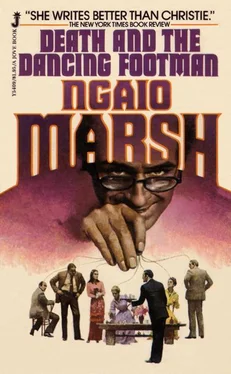Ngaio Marsh - Death And The Dancing Footman
Здесь есть возможность читать онлайн «Ngaio Marsh - Death And The Dancing Footman» — ознакомительный отрывок электронной книги совершенно бесплатно, а после прочтения отрывка купить полную версию. В некоторых случаях можно слушать аудио, скачать через торрент в формате fb2 и присутствует краткое содержание. Жанр: Классический детектив, на английском языке. Описание произведения, (предисловие) а так же отзывы посетителей доступны на портале библиотеки ЛибКат.
- Название:Death And The Dancing Footman
- Автор:
- Жанр:
- Год:неизвестен
- ISBN:нет данных
- Рейтинг книги:4 / 5. Голосов: 1
-
Избранное:Добавить в избранное
- Отзывы:
-
Ваша оценка:
- 80
- 1
- 2
- 3
- 4
- 5
Death And The Dancing Footman: краткое содержание, описание и аннотация
Предлагаем к чтению аннотацию, описание, краткое содержание или предисловие (зависит от того, что написал сам автор книги «Death And The Dancing Footman»). Если вы не нашли необходимую информацию о книге — напишите в комментариях, мы постараемся отыскать её.
Death And The Dancing Footman — читать онлайн ознакомительный отрывок
Ниже представлен текст книги, разбитый по страницам. Система сохранения места последней прочитанной страницы, позволяет с удобством читать онлайн бесплатно книгу «Death And The Dancing Footman», без необходимости каждый раз заново искать на чём Вы остановились. Поставьте закладку, и сможете в любой момент перейти на страницу, на которой закончили чтение.
Интервал:
Закладка:
As soon as they came out on the platform before the house, they found that someone else had arrived. Nicholas’ car had been driven away and in its place stood a very smart three-seater from which servants were taking very smart suit-cases.
“That’s not Hersey Amblington’s car,” said Mrs. Compline.
“No,” said Nicholas. And he added loudly: “Look here, what’s Jonathan up to?”
“What do you mean, darling?” asked his mother quickly.
“Nothing,” said Nicholas. “But I think I recognize the car.” He hung back as the others went into the house, and waited for Mandrake. He still wore Jonathan’s cape over his uniform and it occurred to Mandrake that since Nicholas allowed himself this irregularity he must be very well aware of its effectiveness. He put his hand on Mandrake’s arm. The others went into the house.
“I say,” he said, “ is Jonathan up to anything?”
“How do you mean?” asked Mandrake, wondering what the devil Jonathan would wish him to reply.
“Well, it seems to me this is a queerly assorted house-party.”
“Is it? I’m a complete stranger to all the other guests, you know.”
“When did you get here?”
“Last night.”
“Well, hasn’t Jonathan said anything? About the other guests, I mean?”
“He was very pleased with his party,” said Mandrake carefully. “He’s longing for it to be an enormous success.”
“Is he, my God!” said Nicholas. He turned on his heel and walked into the house.
Mrs. Compline and Chloris went up to their rooms; the three men left their overcoats in a downstairs cloak-room where they noticed the twin of Jonathan’s cape. When they came back into the hall they could hear voices in the library. As if by common consent they all paused. There were three voices — Jonathan’s, a masculine voice that held a foreign suggestion in its level inflections, and a deep contralto.
“I thought as much,” said Nicholas, and laughed unpleasantly.
“What’s up?” William asked Mandrake.
“Nothing, so far as I know.”
“Come on,” said Nicholas. “What are we waiting for? Let’s go in.”
He led the way into the library.
Jonathan and his new arrivals stood before a roaring fire. The man had his back turned to the door, but the woman was facing it with an air of placid anticipation. Her face was strongly lit by a wall lamp and Mandrake’s immediate reaction to it was a sort of astonishment that Jonathan could have forgotten to say how spectacular she was. In Mandrake’s world women were either sophisticated and sleek or hideous and erratic. “Artificiality,” he was in the habit of saying, “is a fundamental in all women with whom one falls in love, and to so exquisite an extreme has artifice been carried that it sometimes apes nature with considerable success.” This subtlety of grooming appeared in Madame Lisse. Her hair was straight and from a central parting was drawn back and gathered into a knot at the nape of her neck. It lay close to her head like a black satin cap with blue high-lights. Her face was an oval, beautifully pale; her lashes needed no cosmetic to darken them; her mouth alone proclaimed her art, for it was sharply painted a dark red. Her dress was extremely simple, but in it her body seemed to be gloved rather than clothed. She was not very young, not as young as Chloris Wynne, not perhaps as pretty as Chloris Wynne either, but she had to the last degree the quality that Mandrake, though he knew very little French, spoke of and even thought of as “ soignée . And, in her own vein, she was exceedingly beautiful.
“Madame Lisse,” Jonathan was saying, “you know Nicholas, don’t you? May I introduce his brother; and Mr. Aubrey Mandrake? Hart, do you know…” Jonathan’s introductions faded gently away.
Dr. Hart’s bow was extremely formal. He was a pale dark man with a compact paunch and firm white hands. He was clad in the defiant tweeds of a firmly naturalized ex-Central-European. Mandrake gathered from his manner that either he had not met Nicholas Compline and didn’t wish to do so, or else that he had met him and had taken a firm resolve never to do so again. Nicholas, for his part, acknowledged the introduction by looking at a point some distance beyond Dr. Hart’s left ear, and by uttering the words “How do you do?” as if they were a malediction. Madame Lisse’s greeting to Nicholas was coloured by that particular blend of composure and awareness with which Austrian women make Englishmen feel dangerous and delighted. With something of the same air, but without a certain delicate underlining, she held out her hand to William and to Mandrake. Mandrake remembered that Nicholas had known Madame Lisse was coming to the party and saw him take up a proprietary position beside her. “He’s going to brazen it out,” thought Mandrake. “He’s going to show us the sort of dog he is with the ladies, by Heaven.” Mandrake was right. Nicholas, with a sort of defiant showmanship, devoted himself to Madame Lisse. He stood beside her in an attitude reminiscent of a Victorian military fashion-plate, one leg straight and one flexed. Occasionally he placed one hand on the back of her chair, while the other went to his blond moustache. Whenever Dr. Hart glared at them, which he did repeatedly, Nicholas bent towards Madame Lisse and uttered a loud and unconvincing laugh calculated, Mandrake supposed, to show Dr. Hart how vastly Nicholas and Madame Lisse entertained each other. Madame was the sort of woman whose natural habitat was the centre of a group of men and, with the utmost tranquillity, she dominated the conversation and even, in spite of Nicholas, contrived to instil into it an air of genuine gaiety. In this she was ably supported by Jonathan and by Mandrake himself. Even William, who watched his brother pretty closely, responded in his own odd fashion to Madame’s charm. He asked her abruptly if anybody had ever painted her portrait. On learning that this had never been done he started to mutter to himself, and Nicholas looked irritated. Madame Lisse began to talk to Mandrake about his plays, Jonathan chimed in, and once again the situation was saved. It was upon a conversation piece, with Madame Lisse very much in the centre of vision, that Mrs. Compline and Chloris made their entrances. Mandrake thought that Mrs. Compline could not be aware of the affair between Nicholas and Madame Lisse, so composedly did she acknowledge the introduction. But if this was the case, what reason had Chloris given for the broken engagement with Nicholas? “Is it not impossible that everybody but his mother should be aware of l’affaire Lisse ?”
Mandrake speculated. “Perhaps she sees him as a sort of irresistible young god, choosing where he will, and, without resentment, accepts Madame as a votaress.” There was no doubt about Chloris’ reaction. Mandrake saw her stiffen and go very still when Jonathan pronounced Madame Lisse’s name. For perhaps a full second neither of the women spoke and then, for all the world as if they responded to some inaudible cue, Chloris and Madame Lisse were extremely gracious to each other. “So they’re going to take that line,” thought Mandrake, and wondered if Jonathan shared his feelings of relief. He felt less comfortable when he saw Mrs. Compline’s reaction to Dr. Hart. She murmured the conventional greeting, looked casually and then fixedly into his face, and turned so deadly white that for a moment Mandrake actually wondered if she would faint. But she did not faint. She turned away and sat in a chair farthest removed from the light. With the effect of entering on a cue, Caper brought in sherry and champagne cocktails.
The cocktails, though they did not perform miracles, helped considerably. Dr. Hart in particular became more sociable. He continued to avoid Nicholas but attached himself to Chloris Wynne and to William. Jonathan talked to Mrs. Compline; Mandrake and Nicholas to Madame Lisse. Nicholas still kept up his irritating performance — now, apparently, for the benefit of Chloris. Whenever Madame Lisse spoke he bent towards her and, whether her remark was grave or gay, he broke out into an exhibition of merriment calculated, Mandrake felt certain, to arouse in Chloris the pangs proper to the woman scorned. If she suffered this reaction she gave no more evidence of her distress than might be discovered in an occasional thoughtful glance at Nicholas, and it seemed to Mandrake that if she reacted at all to the performance, it was pleasurably. She listened attentively to Dr. Hart, who became voluble and bland. Chloris had asked if anyone had heard the latest wireless news. Hart instantly embarked on a description of his own reaction to radio. “I cannot endure it. It touches some nerve. It creates a most disagreeable — an unendurable— frisson . I read my papers and that is enough. I am informed. I assure you that I have twice changed my flat because of the intolerable persecution of neighbouring radios. Strange, is it not? There must be some psychological explanation.”
Читать дальшеИнтервал:
Закладка:
Похожие книги на «Death And The Dancing Footman»
Представляем Вашему вниманию похожие книги на «Death And The Dancing Footman» списком для выбора. Мы отобрали схожую по названию и смыслу литературу в надежде предоставить читателям больше вариантов отыскать новые, интересные, ещё непрочитанные произведения.
Обсуждение, отзывы о книге «Death And The Dancing Footman» и просто собственные мнения читателей. Оставьте ваши комментарии, напишите, что Вы думаете о произведении, его смысле или главных героях. Укажите что конкретно понравилось, а что нет, и почему Вы так считаете.












